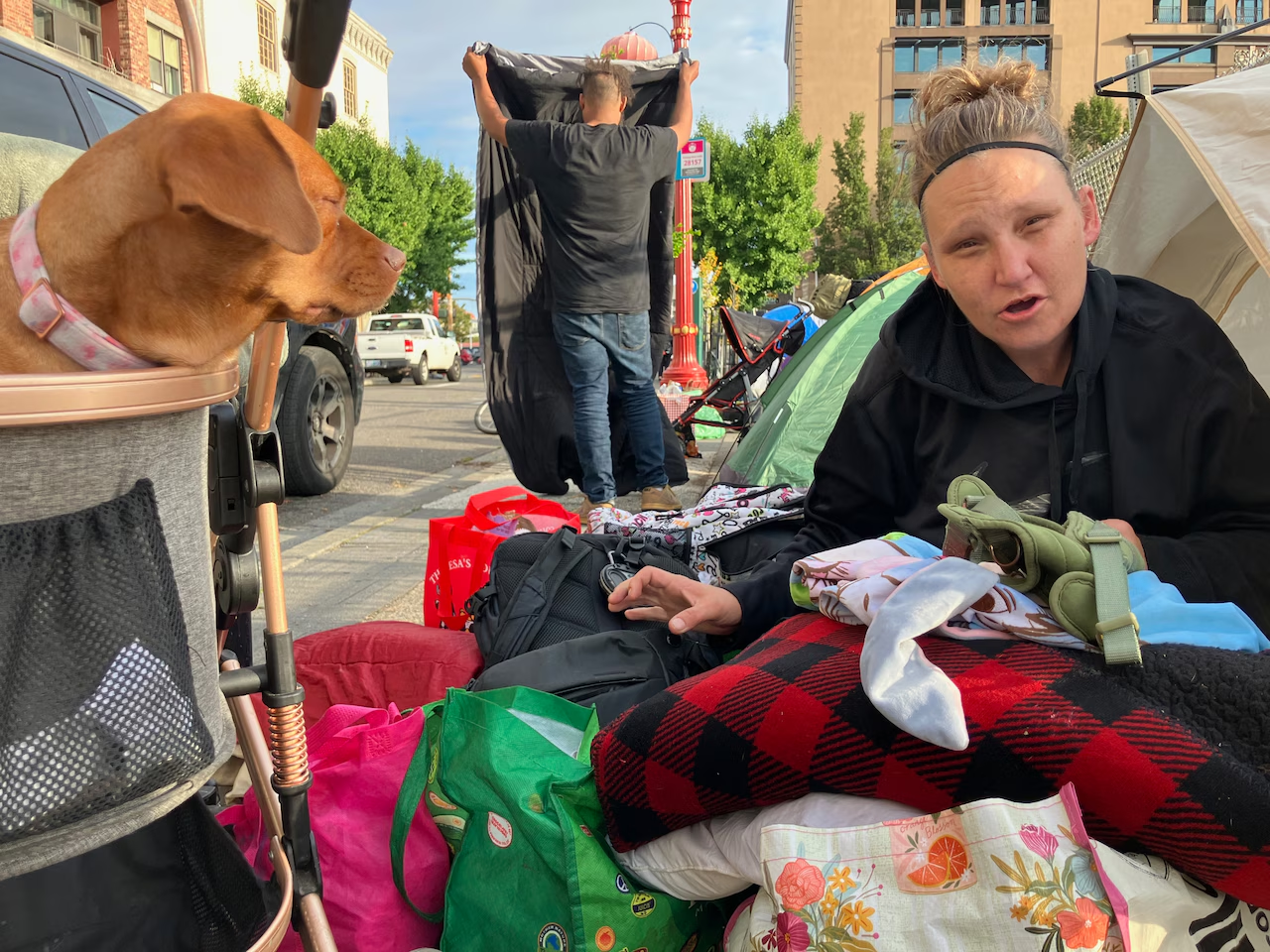PORTLAND, Ore. — On a cool September morning, a new volunteer outreach initiative designed to connect with unhoused Portlanders launched with speeches, backpacks of supplies, and promises of compassion. But only hours later, the same block that hosted the outreach saw a city-led sweep, underscoring the contradictions at the heart of Portland’s homelessness response.
Michelle and Penny
Among those first approached by outreach workers was Michelle, 45, who had pitched her beige tent a few days earlier along Northwest Fourth Avenue near Flanders. With her was Penny, the small brown dog she adopted after its previous owner died of an overdose.
“I haven’t been out on the streets like this for a minute,” Michelle said as she organized her belongings outside her tent just before 8 a.m. She has been cycling in and out of homelessness for years, staying at motels or with friends when possible.
Also Read
Michelle quickly became a focal point of the day’s events—an emblem of both the promises and the limits of the city’s approach.
Mayor Wilson Rallies Volunteers
Earlier that morning, Mayor Keith Wilson greeted a crowd of volunteers, outreach staff, and nonprofit partners at CityTeam, a faith-based shelter in Old Town.
Wilson praised the work of city outreach director Kim James and laid out his vision: expanding Portland Street Response, opening 1,500 new shelter beds by December 1, and sending dozens of people home to families outside the city each week.
“It is not code to leave your citizens lying incapacitated on the street,” Wilson told the crowd. “It is not moral, it is not legal, it is not logistically supported.”
The mayor emphasized the urgency of winter. “We’re not leaving people on the street this December,” he said.
“We All Have a Name”
The new initiative, called We All Have a Name, aims to increase street-level engagement by mobilizing volunteers alongside professional outreach workers.
CityTeam’s Lance Orton, himself formerly homeless, offered practical guidance: don’t give out cash, approach people individually, ask their names, and offer water, snacks, socks, or bus tickets.
Volunteers picked up bright blue drawstring backpacks filled with supplies and donned teal T-shirts bearing the program’s name.
“This is going to be one way we can connect folks to the issue,” said Stephanie Wieber, a volunteer. “If we leave it to social services, they will drown.”
First Encounters on Fourth Avenue
Outside, outreach teams fanned out. Michelle and another camper were among the first approached. The man accepted a granola bar and socks. Michelle introduced herself by her street name, Pinky, and asked for help finding shelter.
Outreach worker Sash Jarmer wrote her a voucher for CityTeam’s shelter but explained it was a sober facility, meaning she could be turned away if intoxicated.
Michelle shook her head. “That’s not going to work for me,” she said, though she understood the rules. “People who really want to get their lives together can’t be around open drug use.”
She mentioned she had tried the mayor’s newly opened overnight-only shelters but was unimpressed.
“You want my opinion? These overnight shelters the mayor opened because of his promise to the community—it’s bull. You don’t get no services at those shelters.”
A Sudden Shift: Tent Removal
As Michelle packed up her belongings, a woman in a yellow vest and navy Rapid Response shirt approached with news: the block had been posted for removal a week earlier. Everyone needed to clear out within the hour.
“There goes my shower,” Michelle muttered. She had planned to clean up at a resource center before making calls to find a shelter bed.
She began methodically pulling her things from the tent: a striped green suitcase, folded blankets, Penny’s toys tossed into her stroller, and a pillow.
By mid-morning, the cheerful tone of volunteer outreach had given way to the familiar urgency of displacement.
Tensions in the City’s Strategy
For Mayor Wilson, outreach and enforcement are both parts of his broader pledge to end unsheltered homelessness by winter. His administration has expanded shelter capacity, accelerated RV removals, and tightened rules around public camping.
But for many on the ground, the dual approach feels contradictory—offering compassion one hour, clearing camps the next.
Michelle voiced skepticism about the city’s strategy. “To me, it’s just the mayor trying to bluff the community that he’s doing what he said he would do,” she said. “And he’s just putting a Band-Aid on it. A cheap Band-Aid too.”
Volunteers and Organizers Reflect
By 8:50 a.m., outreach volunteers had wrapped up their shifts. Orton encouraged sign-ups for future efforts, promising weekly expansions across the city. He said data collection on the number of people served would begin soon.
For volunteers like Wieber, the day underscored both the potential and the difficulty of connecting with unhoused neighbors. “We just have to keep being creative,” she said.
Swept Away
At 9:23 a.m., a Rapid Response van and a Portland Police patrol car arrived at the encampment. Michelle and Penny had already left.
By 10:15 a.m., nearly all the tents were gone. One woman slipped a candy bar into her outreach backpack as she finished packing. By the time crews cleared the block, only a single tent remained.
What began as a morning of mayoral cheerleading and volunteer energy ended as so many mornings in Portland do—with another sweep, another block cleared, and the city’s homelessness crisis still unresolved.












